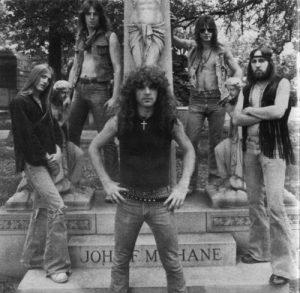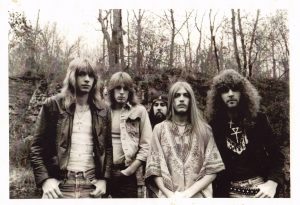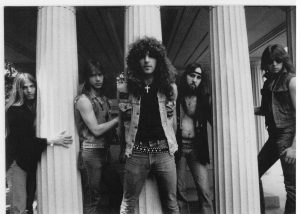
During the 30th anniversary year of ‘PSALM 9’, RICK WARTELL, ERIC WAGNER and JEFF OLSON could sit have back to revel in the album’s now-legendary status. Or they could carry on their band’s legacy with a brand new album, or even form a brand new band with one-time bassist RON HOLZNER. The four veterans of doom talked the past, present and two very different futures for TROUBLE with Sarah Kitteringham back in Issue Nine
Thirty years after Metal Blade Records branded Trouble “White Metal” as a counterpoint to Slayer and the burgeoning wave of black metal that was percolating on the continent to the East, doom is finally standing alone, minus comparative or contradictory labeling. The past few years have seen an explosion in the genre’s popularity and notoriety, and an unapologetic fusing of the music on both heavy and lite ends of the spectrum. Finally, the progenitors who were criminally underrated in their heyday are becoming renowned. Pentagram, Pagan Altar, Candlemass and Saint Vitus have headlined festivals, toured, and released definitive albums. Chuggin along at a less visible (but no less seminal) rate is Trouble, whose opus ‘Psalm 9’ celebrates its 30th anniversary this year. We here at Iron Fist worship the album; therefore it was time to catch up with its creators to discuss its origins and continuing impact. Unfortunately, this took a whole lot of untangling, as Trouble continues on, but so too does the band that emerged after two original members and a one-time bassist left: that project is The Skull. Therefore, we had two conversations: one that involved The Skull vocalist Eric Wagner, drummer Jeff Olson, and bassist Ron Holzner. The second was with Trouble guitarist Rick Wartell, who formed the band in 1979 and anchors Trouble to this day.
“I formed Trouble when I was still in high school with some of my buddies. We wanted to just learn to play our instruments at that point,” begins Wartell. He chuckles; “We were just doing cover songs, you know, like UFO, Black Sabbath, Judas Priest. I think it was 1981, or ‘82 maybe, that we decided to start being a little more serious about it, and thought we’d bring in a singer and another guitar player. So we brought in Bruce [Franklin] and Eric [Wagner], and that’s when we started writing most of our own material.” He continues, “That’s when we sat down and had a meeting about what we wanted to be; a Sabbath sounding band with two guitarists that can do harmony solos like Judas Priest’.”
Rounded out by drummer Jeff Olson and bassist Tim Ian Brown, the young band hunkered down in the basement and began practicing. “We were a really hard working band. We had a real good work ethic; we rehearsed five days a week, every single week. We never missed a day,” recalls Wartell. “We wouldn’t go out and play live shows, we’d just write music and rehearse. And we did that for over a year straight, before we even began to record.” Eventually they began playing live, and recorded one of their shows to a tape. “One of the guys who was hanging around with the band – we weren’t really a working band so it’s hard to say he worked for us – but he was one of our friends, and he started passing this tape along to the underground. And next thing you know, we got offers in the mail. I had contracts sent to me from two or three different record companies. We picked Metal Blade because we liked the sound of it, we were like ‘let’s pick this label because they sound more metal!’.
At the time, Metal Blade Records had just been founded by a music slinger at Oz Records known as Brian Slagel, former editor of ‘New Heavy Metal Revue’, one of metal’s first fanzine that lovingly placed bands like Cirith Ungol on their cover. His knowledge and penchant for selecting burgeoning bands was impressive. The label’s debut release was the infamous ‘Metal Massacre’ compilation (featuring Ratt and Metallica, among others); they continued with releases and licensing agreements with Bitch, Warlord, Slayer and Satan. As the label’s impressive roster grew, the overly prepared quintet went into the studio. They had over two-dozen tracks written, a handful of covers of Black Sabbath, Angel Witch, Accept and Cream ready, and were thrilled to start. As rabid fans of underground bands like Witchfinder Genera and Angel Witch, they were stoked to continue the tradition. “We’d never done it before. We got in a van, we drove to LA, we were just kids. We didn’t know what to expect,” explains Wartell. “When we got to the studio we met [producer] Bill Metoyer and Brian Slagel, and Bill handled us as well as you can handle a brand new band. We are still friends today, he’s just one of the best guys you’ll ever meet. What they did was just set us up and had us play the songs live, and Bill got the tones that sounded like Trouble, and we recorded it.” He continues; “Probably the most nerve-racking thing about being in the studio were the vocals and the solos. The drums, the rhythm guitar and the bass, that was all recorded live; we just played and he recorded it, so we got through that really quick. We only had five or six days to record the thing.”
Hence the powerhouse that is their eponymous debut, originally dubbed ‘Trouble’ before it was rebranded as ‘Psalm 9’ in 1990. Moody, introspective and irrefutably skull-crushing, the album was wholly out of place upon release in 1984. Infused with numerous biblical references, deeply embedded dramatics courtesy of the wailing, warbled vocals, an uncharacteristic (for metal) positivity, and huge sonic weight courtesy of the production, impenetrable riffs, epic wailing and rollicking drums, it’s an undisputed metal classic. Dubbed one of the most important metal albums of all time by numerous publications, it’s a fan favourite and highlight of a lengthy and strong discography. Featuring such gems as ‘The Tempter’, ‘Assassin’, ‘Bastards Will Pay’ (a beefy cover of Cream’s ‘Tales Of Brave Ulysses’, was added to later editions) the album is mint from start to the groovy, jam band finish. However, it’ the swirling opening track, with its tribal intro and atmospheric squeals, followed by that crushing riff, which Wartell remembers most fondly. “It was the very first song we did, and it’s like ‘Wow! We’re hearing it through headphones in a studio and it’s being recorded for a record!’“It just brings back those memories of [being] excited, nervous, you know? You don’t know what to expect. I remember ‘The Tempter’ a lot, because we wanted to start with the song. We said, ‘How can we make it sound like there is fire in the background?’ I remember Oly [Olson grabbing a paper bag, and he’s crumbling the paper bag, and we’re like, ‘That’s it, let’s use that,’ he laughs.
Despite its apparent quality, Metal Blade wasn’t entirely sure how to market the album given the current state of metal. Trouble was dubbed “White Metal” and people were convinced the band was Christian; this was entirely inaccurate. Yes, ‘Psalm 9’ had a biblical focus, but that was because lyricist and vocalist Wagner was following in the cavernous footsteps of Black Sabbath, wanting to juxtapose the light with the dark. “We were never a Christian band. Back when we first started, in the metal scene at that time a lot of the bands, like Slayer and Venom, Mercyful Fate, were writing Satanic lyrics,” the singer explains, audibly groaning at the continuing association. “I just didn’t believe in that… I probably just said as many Satans and Lucifers as anybody else, the only difference for me, was I was searching for something… I always wanted to offer a little ray of hope, a way out.” Although it set Trouble apart, Wartell states he wasn’t particularly concerned about their popularity. “As far as marketing and all that, we were just kids, it wasn’t even in the equation. We just wanted to put a band together and play,” he recalls. “We were huge fans of Angel Witch, that was one of our number one bands we’d listen to. And also Witchfinder General. I remember when I got their first album, I listened to that lot. Yeah, we were big fans of those bands, we knew they were obscure. You know, in the metal scene, or the doom scene back then, it was not cool to be popular. If you found a cool band like Angel Witch or Witchfinder General, you almost didn’t want other people to know about it! It was your band, it was really cool to be underground and it was just your little clique that knew about that band.”
In hindsight this seems somewhat silly, as in the early-to-mid ‘80s, the genre was spreading around the world with influential releases from Witchfinder General, Pentagram, Saint Vitus an Candlemass. Yet, these bands operated without the benefit of reasonable geographic proximity and often didn’t even know one another existed. They were often considered the epitome of uncool. Given the simultaneous dissemination of extreme metal, the commercial explosion of thrash and hair metal, these retro-regressive acts stuck out like sore thumbs. For example, when Vitus opened for Black Flag, Dave Chandler infamously recalled the brutal reception: “Pretty much 90 percent of them hated us with a passion. They were throwing whatever wasn’t nailed down and generally fucking with us.” 2014 paints a much different picture. Labels are rushing to sign bands with the Hammond organ, warbling vocals, Sabbath-esque tones and riffs, or promo pictures with ‘The Necronomicon’/candelabrum/Orange amps. The winds of change have blown, and now metal fans, who are a historically appreciative bunch, are consuming back catalogues of these titans en masse.
“It’s amazing. All we did was buy a van and drive up to California to make our first record We were all excited, you know?” says Wagner, somewhat puzzled. “And now we’re talking about it 30 years later, it’s bizarre. To me, back then, we were behind the times, but now that album is relevant again.” Doom is relevant. The emotionality and religious themes, along with the sexy, groovy, thunderous nature of the music, have contributed to its resurgence. In the mid 2000s, technical death was reaching critical mass and many metal fans were looking for something with more feeling. Several movements were simultaneously exploding: Baroness, Kylesa, Torche, High On Fire and Isis, bands that sonically built off the template to perform what is know known as sludge or stoner metal (equally inspired by bands like Melvins, Eyehategod, Neurosis and Sleep). Another was the rise of “occult” rock, which combined diabolic – read: overtly Satanic for their time – psychedelic rockers Coven with the classic acts. The third was far more underground as classic melodic doom surged: this was a clear-cut distillation of heavy metal. Acts like Ironsword, Lamp Of Thoth, Hour Of 13, Procession, Altar Of Oblivion, Cauchemar and Funeral Circle stuck with the Sabbathian tritone, citing Trouble, among other bands, as a key influence. Like Trouble did on their debut these bands unapologetically celebrate their influences by constantly recording and releasin obscure covers. “I think they are very unpretentious. They pay homage to the bands that influenced them, an Trouble’s no different,” says Wartell. “We never pull any punches. I get asked a lot, ‘How does it feel to be a legend who started this whole trend’, and my answer is always ‘We didn’t start this; we just tried to add our thing to it’. It was there long before we started it, so I think that doom bands are a little bit more down to earth when it comes to this kind of thing, with less ego.”
Hence the hesitation to heap credit on themselves for helping doom come into its own, both sets of interviewees were modest about their impact, although acknowledged the music continues to resonate. For that, they are extremely thankful. “When I’m out there singing those songs right now, singing the words, singing the music and everything, it just seems like it still fits today What’s going on musically and lyrically,” says Wagner. “Those people are in the bands now who have ‘Psalm 9’ as their influence, they were kids when they listened to that. Just like we were young kids when we were listening to Sabbath… I’m just some dude from Aurora, Illinois. To be considered an influence on people… that’s pretty good compliment.”
Jeff Olson adds appreciatively; “It’s one of the main records that most doom fans mention as an influence, that’s pretty awesome. I influenced a whole new chapter, and basically it’s still strong and heavier than most of the shit that’s out there nowadays, it’s held up unbelievably.”
Wartell is reserved about his place in the genre, although he and his former bandmates acknowledge that doom’s popularity explosion has aided both of their current projects. “It’s no different than Angel Witch and Witchfinder General, or Pentagram, I think the were called Death Row at the time. You’re just doing what you do, and it just falls in the right place. You’re able to record it; people are able to hear it. Maybe I’m just too close to it to see it at this point, but we just helped carry on the legacy,” he says. “That’s basically how I see it.”
The Skull bassist Ron Holzner, who joined Trouble shortly before their third album ‘Run To The Light’ (1987), and played with them until 2002, concurs, and is thrilled, like his current and former bandmates, that doom is now an accepted and celebrated movement within heavy metal. “Doom is a special genre now. It actually became a specific thing, this low-tuned wonderful, I don’t know what you’d call it, trippy music. I think it’s close to home with psychedelic music, and also super heavy music,” he says. “I love that fact,” adds Olson. “I read an article in The New York Times… it was called ‘Heady Metal’. And it showed lines coming from acid rock and hard rock, splitting apart when it went to thrash, and it names groups, and it named us, next to Sabbath. They named us next to Saint Vitus and of course, Pentagram and the Obsessed, and groups that are right next to that category,” he enthuses. “I’m proud of that, itt is just incredible that that could happen… I find that it’s artistic, it’s got everything from primal screams to super quiet dynamics, [and] it’s got everything from laughter to tears.” Wagner proclaims, “It’s heavy as FUCK!”“It’s given bands like Pentagram and Saint Vitus a second chance, you know,” says Olson. “They were playing that with us way back in the day, and not that many people came out to see them, they weren’t that popular… nowadays they are more popular than ever, and it’s pretty awesome. [There’s a] big crowd out there who wants to hear it, so, we are going to deliver it for them.” Wartell sums up our conversation about ‘Psalm 9’ and its continuing legacy with a characteristic humbleness. “I think the best thing that came out of ‘Psalm 9’ was accomplishing our first recordin as a band. I think it was a big accomplishment for us, and it set us onto the direction we wanted to go as a band. And you know, five guys from the Midwest playing in a basement, to go out to LA and do an album, for us, that was huge, a huge accomplishment. To have the legacy of this particular piece of work we did, to last this long, that people are still talking about and revering, it’s an honour to be a part of that.” Of course, he won’t praise it too much. “Is it the best record we ever did? Hard to say. The quality of the recording and the production? Absolutely not. The riffs? Maybe some of the best riffs we’ve ever done, well, it’s debatable. But we are still going, and we’ll see what happens. We’re not over yet.”


Copyright © 2024 Iron Fist Magazine. All Rights Reserved.